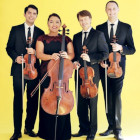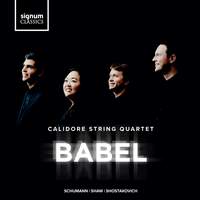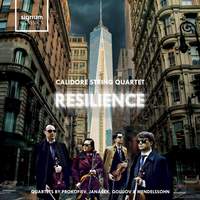Interview,
The Calidore String Quartet on Babel
 Formed ten years ago in Los Angeles, the Calidore String Quartet have acquired a reputation for putting together thoughtful, century-spanning programmes of music.
Formed ten years ago in Los Angeles, the Calidore String Quartet have acquired a reputation for putting together thoughtful, century-spanning programmes of music.
Both their albums released on Signum illustrate this approach: Resilience, drawing together the works of various composers undergoing a variety of personal traumas, and now Babel, which explores the relationship between music and language and (inevitably in a time of lockdowns and isolation) what music can do in the absence of speech.
I spoke to the Quartet's members about this album, and their approach to recording more generally.
Unlike many quartets, who commonly record sets of related works (a given composer’s opus x, nos. y-z…), your approach tends more towards 'concept albums' – your recent release Resilience and even your earlier recordings for Editions Hortus of music relating to the First World War. Do you find it easier, or more difficult, to put albums and programmes together this way?
We have generally taken the approach of making albums that make up an interesting, thematic concert program. In previous generations, this would have been problematic. If someone wanted to listen to all of our Mendelssohn quartets as an example, they would have to find multiple CDs and navigate to the correct tracks. As the primary form of music consumption now is through online streaming platforms and people are very quickly able to search out specific works, this is no longer an issue. With this in mind, we have generally preferred to create albums that spin a story and create a narrative through contrasting styles. We will make exceptions to this when we record some of the cornerstones of the repertoire, particularly with the Beethoven cycle!
You recorded these three pieces in mid-April 2019, well before most of us had even heard of Covid-19. It’s since become necessary to put restrictions in place on gatherings and group musicmaking; how much have you been able to play together as a quartet during the last six months or so?
When the lockdowns began, we made the decision to isolate, not knowing that it would end up being nearly four months before we would reunite again. We reassembled in July and were able to begin rehearsing in preparation for a number of concerts later that month. Since collectively returning to New York City, we have been fortunate to continue our work together learning new repertoire and reviewing Beethoven string quartets with plans to begin recording the cycle in early 2021.
The first two of Caroline Shaw’s Three Essays seek to communicate sentiments to do with language – the 'confusion of tongues' in the story of the Tower of Babel, and the contemporary 'echo chamber' effect found online. How easy did you find it to get these messages across without words to help you?
Caroline Shaw has a tremendous talent for writing for strings. Her own expertise on the violin allows her to write in such a way that it becomes very clear to the performer what her intentions are. Occasionally she will go so far as to use imagery to place the performer in the right frame of mind. With the knowledge of the background of the first two essays along with her clear compositional skills, it is easy for the quartet to immerse ourselves and portray her intended message.
You mention that Shostakovich’s Ninth String Quartet adopts Jewish musical idioms as a kind of code, with the recently-censured composer identifying with the oppression of the Jews. Given that it was precisely his calling-out of anti-Semitism in the Babi Yar symphony that had got him into trouble, why do you think he returned to this potentially dangerous metaphor time and again?
Shostakovich was a person of deep convictions. He needed to give voice to the oppressed and persecuted people, including himself. The Soviet regime tried hard to oppress and censor his belief system. His music was his only opportunity to express his thoughts about events past and present. If his sentiments and criticisms about the government were expressed in words, the result would have been catastrophic for Shostakovich. Therefore he had to embed the symbols for his beliefs deep within his music.
Although Shaw’s Three Essays have very pertinent themes relating to communication and miscommunication, they were in fact written a few years ago rather than as a conscious response to the pandemic. Are you aware of any composers yet tackling the difficult topic of Covid-19 itself as a basis for new works?
Ellen Reid has composed a Soundwalk which is an original composition that can be accessed through an app. It allows listeners in New York City to accompany their socially-distanced walk through Central Park. Using GPS technology, the playlist changes as the listener approaches different areas of the park. It’s a terrific idea and yet another way music is bringing us closer in this time of distance.
Calidore String Quartet
Available Formats: CD, MP3, FLAC, Hi-Res FLAC
Calidore String Quartet
Available Formats: CD, MP3, FLAC, Hi-Res FLAC




